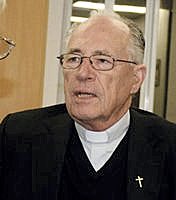The Year of the Priest is intended to be first and foremost a time of prayer—by priests, with priests, and for priests. It involves the whole church, and benefits the whole church. We welcome Pope Benedict’s invitation.

It is also a time for us to reflect on the meaning of ordained ministry in a context however, that is often negative. Our priesthood has been undermined in ways that make us all feel ashamed. The scandal of clergy sex abuse is one example and readers will be able to think of others. We cannot and must not ignore this.
But it is also being undermined in subtler ways. To suggest that Pope Benedict’s ‘inspired move’ from a Year of Paul to a Year of the Priest was intended to draw a contrast between Paul who was ‘never ordained’ and ordained priesthood is to misrepresent the Pope’s intentions.
To suggest that priests are being asked to reflect on ‘what “added value” ordination brings to baptism…’ is to distort the discussion. Ordination was never about ‘added value’.
To draw conclusions about ordination based on the earliest years of the apostolic era before the church’s ministries had finished developing is to be selective indeed.
None of our ministries—in their present form—is to be found in the New Testament scriptures. Instead we find a plurality of charisms, roles and ministries. By a gradual process that began even during the lifetime of the apostles and continued after their deaths, some of these roles and ministries coalesced into the ordained ministries we have inherited. Any research that limits itself to the earliest writings of the apostolic era disqualifies itself from understanding the ministries we have today, and even from understanding the origins of these ministries in the New Testament writings as a whole.
Nor can we ignore the light thrown on the apostolic era by writers such as Clement of Rome, writing just 40 years after Paul’s first letter to the Corinthians and Ignatius of Antioch, who lived during the latter part of the apostolic era itself.
The emergence of clericalism The coalescence of New Testament roles and ministries into the ministries of deacons, presbyters and bishops is one thing; the development of these into a kind of privileged and separate class within the church is another.
Various sociological factors contributed to this less fortunate development: for example, the kind of leadership that was sometimes expected of bishops at the time when the magistrates of the Roman Empire were becoming less effective; the better opportunities that clergy had for acquiring an education than did most lay people after the Barbarian invasions; and even the use of Old Testament terminology by the early fathers of the church, to describe Christian ministry—all these factors contributed to setting the clergy apart and above, resulting in privileges and exemptions that even became incorporated into medieval civil and canon law.
The undoing of clericalism Social scientists speak of ‘group bias’, which results from a natural tendency to describe any organisation by reference to those in it whose profile is more prominent. Historically, the clergy and religious have had the highest profile in the church so when people have referred to the church, they have often meant its priests and religious. It was an easy step from there to assume that the call to holiness was mainly for religious and less for others; and responsibility for the mission of the church mainly for those who were ordained.
These assumptions are not harmless. Is it really harmless for people to think that some belong to the church more and some less depending on whether or not they are ordained? Or that holiness of life is less accessible to those who are not priests or religious? Or that responsibility for the mission of the church does not come with one’s baptism? Is it really harmless to be under the impression that those who are not ordained participate in the Eucharist less than those who are ordained? Is it really harmless to imagine that particular callings within the church somehow ‘add’ to baptism?
These perceptions—even when they are the perceptions of lay people—are what we mean by clericalism.

